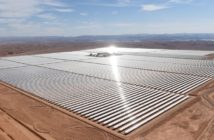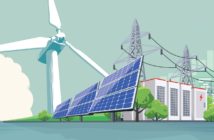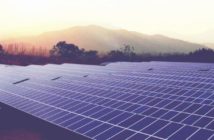GULF NEWS
BUSINESS
The country’s reserves and production of conventional energy resources is small
By Saadallah Al Fathi, Special to Gulf News
The UAE recently gave Morocco $100 million (Dh367.3 million) to support its programme of building solar and wind power plants. This is reported to be part of a partnership to finance development projects in Morocco worth more than $5 billion over five years.
Morocco’s drive into renewable energy is understandable and admirable. The country’s reserves and production of conventional energy resources is small and Morocco is burdened with a huge oil import bill of about $8 billion a year at today’s prices. Morocco’s oil production is only 5,000 barrels a day and has to import the rest of its requirements of about 235,000 barrels a day.
At the same time, Morocco’s natural gas production was only 2 billion cubic feet (Bcf) in 2011 but it receives around 21 Bcf a year from Algeria to compensate as transit fees for Algerian gas to Spain through the Maghreb Europe Gas Pipeline. Morocco also imports 4.6 million tonnes of coal to fire some of its power stations.
With such modest fossil fuel resources and the burgeoning energy requirements of its 35 million people, Morocco decided to put greater effort into tapping its abundant solar and wind energy resources which are said to be among the best in Africa. Solar-based power generation projects are well under way and the plan is to reach 2,000MW in 2020. Five sites have been identified which would tap two technologies, Concentrated Solar Power (CSP) and Photovoltaic.
Small plants of less than 2MW are allowed under the Renewable Energy Law and the private sector may make a push in remote areas. At the same time, there is a programme to promote solar water heaters and to have installed panels of 1.7 million square meters in 2020. This would correspond to 1,190 GWh in energy terms.
In May, Morocco started on a 160MW solar power plant near the city of Ouarzazate southeast of Marrakesh, which would cost an estimated €630 million (Dh3.13 billion). Further expansions could bring the capacity to 500MW. Completion of the first phase is set for next year.
As for wind energy, the installed capacity in 2010 was 280MW and Morocco aims to reach 2,000MW by 2020. In the south near Tarfaya, Africa’s largest wind farm is set to open at the end of 2014 and would comprise 131 wind turbines with a total capacity of close to 300MW and costing $640 million. A senior minister commented recently: “Between the sites that are operational and those that are still under construction, we are reaching 1,000MW from wind power”, which would be a remarkable achievement.
Energy efficiency
Morocco’s Renewable Energy Law (No. 13-09) is designed to govern and promote investments. Specialised administrations are set up to promote and follow up implementation of projects as well as to measure energy efficiency.
Trade associations will coordinate and encourage local content in the related industries. Universities, engineering schools and related vocational centres are to have specialised courses to create the necessary staff to construct, run and maintain related installations.
Morocco’s total power generation capacity in 2012 was 6,620MW and consumption is increasing by about 6 per cent a year. Within this context, Morocco will invest $13.5 billion over the next four years to boost power generation by 4,585MW and renewable energies are projected to provide over 40 per cent of this.
There is no doubt that the renewable energy plans are expensive to build but the running cost once they are built will be far less than any new capacity fuelled by fossil fuel. The environmental advantages of solar and wind power generation are obvious and Morocco has designed its projects to come under the criteria of the UN’s Clean Development Mechanism (CDM). This may help get some funding for these projects in lieu of their reduction in carbon dioxide emission.
There is also the Energy Development Fund with a $500 million donation from Saudi Arabia and $300 million from the UAE in addition to the $200 million from the Hassan II Fund for Economic and Social Development. The UAE through its support of Morocco’s alternate energy aspirations is destined to gain from such exposures.






